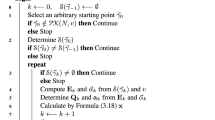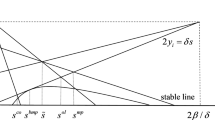Abstract
In this paper, we deal with linear production planning problems in which multiple firms jointly produce some goods. Owen (Math Program 9:358–370, 1975) presents an allocation scheme for the joint profit of the firms through the cooperative game defined by formulating linear programming problems for obtaining optimal production planning. However, since the values of the resources are measured by the shadow prices which are the optimal dual solution to the linear programming problem for the grand coalition, the excess resources in the grand coalition have no value, and players receive no payoff for the excess resources possessed. Moreover, even when some coalitions cannot be formed, the Owen solution does not change and it is not affected by such situations because it is calculated using the optimal dual solution in the linear production planning problem only for the grand coalition. To cope with these difficulties, we revise the definition of the linear production game by introducing a characteristic function taking into account not only the maximized profit but also the value of the excess resources. To the revised linear production game, we introduce a solution concept with the following favorable aspects. (i) The shadow prices of the resources for all coalitions are utilized for calculating the payoffs of the players. (ii) When some coalitions cannot be formed, such situations are appropriately reflected in the payoffs. (iii) The proposed payoff vector is in the core of the revised linear production game. To demonstrate these properties, we give the numerical examples, and calculate the corresponding proposed payoff vectors. Finally, we give an axiomatic characterization of the proposed solution concept.

Similar content being viewed by others
References
Anupindi R, Bassok Y, Zemel E (2001) A general framework for the study of decentralized distribution systems. Manuf Service Oper Manage 3:349–368
Bird GC (1976) On cost allocation for a spanning tree: a game theoretic approach. Networks 6:335–350
Curiel I (1997) Cooperative game theory and applications: cooperative games arising from combinatorial optimization problems. Kluwer Academic Publishers
Curiel I, Derks J, Tijs S (1989) On balanced games and games with committee control. OR Spektrum 11:83–88
Dubey P, Shapley LS (1984) Totally balanced games arising from controlled programming problems. Math Program 29:245–267
Engelbrecht-Wiggans R, Granot D (1985) On market prices in linear production games. Math Program 32:366–370
Fang X, Cho S-H (2014) Stability and endogenous formation of inventory transshipment networks. Oper Res 62:1316–1334
Feltkamp V, van den Nouvceland A, Borm P, Tijs S, Koster A (1993) Linear production with transport of products, resources and technology. Methods Models Oper Res 38:153–162
Fernández FR, Fiestras-Janeiro MG, García-Jurado I, Puerto J (2005) Competition and cooperation in non-centralized linear production games. Ann Oper Res 137:91–100
Granot D (1986) A generalized linear production model: a unifying model. Math Program 34:212–222
Granot D, Huberman G (1981) Minimum cost spanning tree games. Math Program 21:1–18
Granot D, Huberman G (1984) On the core and nucleolus of M. C. S. T. games. Math Program 29:323–347
Granot D, Sošić G (2003) A three-stage model for a decentralized distribution system of retailers. Oper Res 51:771–784
Guardiola LA, Meca A, Puerto J (2008) Production-inventory games and PMAS-games: characterizations of the owen point. Math Soc Sci 56:96–108
Guardiola LA, Meca A, Puerto J (2009) Production-inventory games: a new class of totally balanced combinatorial optimization games. Games Econ Behav 65:205–219
Guardiola LA, Meca A, Puerto J (2021) Enforcing fair cooperation in production-inventory settings with heterogeneous agents. Annals Oper Res 305:59–80
Guardiola LA, Meca A, Puerto J (2021) Unitary Owen points in cooperative lot-sizing models with backlogging. Mathematics 9:869
Hennet J-C, Mahjoub S (2010) Toward the fair sharing of profit in a supply network formation. Int J Prod Econ 127:112–120
Kalai E, Zemel E (1982) Generalized network problems yielding totally balanced games. Oper Res 30:998–1008
Kalai E, Zemel E (1982) Totally balanced games and games of flows. Math Oper Res 7:476–478
Llorca N, Molina E, Pulido M, Sánchez-Soriano J (2004) On the Owen set of transportation situations. Theor Decis 56:215–228
Megiddo N (1978) Cost allocation for steiner trees. Networks 8:1–6
Megiddo N (1978) Computational complexity and the game theory approach to cost allocation for a tree. Math Oper Res 3:189–196
Nishizaki I, Hayashida T, Shintomi Y (2016) A core-allocation for a network restricted linear production game. Ann Oper Res 238:389–410
Nishizaki I, Sakawa M (2000) Fuzzy cooperative games arising from linear production programming problems with fuzzy parameters. Fuzzy Sets Syst 114:11–21
Nishizaki I, Sakawa M (2001) On computational methods for solutions of multiobjective linear production programming games. Eur J Oper Res 129:386–413
Owen G (1975) On the core of linear production games. Math Program 9:358–370
Özener OÖ, Ergun Ö, Savelsbergh M (2013) Allocating cost of service to customers in inventory routing. Oper Res 61:112–125
Peleg B (1986) On the reduced game property and its converse. Internat J Game Theory 15:187–200
Peleg B (1992), Axiomatizations of the Core, in Handbook of Game Theory with Economic Applications, Vol 1, Chapter 13, 397–412, R. J. Aumann and S. Hart (eds.), Elsevier
Perea F, Puerto J, Fernández FR (2012) Avoiding unfairness of Owen allocations in linear production processes. Eur J Oper Res 220:125–131
Pulido MA, Sánchez-Soriano J (2006) Characterization of the core in games with restricted cooperation. Eur J Oper Res 175:860–869
Samet D, Zemel E (1984) On the core and dual set of linear programming games. Math Oper Res 9:309–316
Tamir A (1991) On the core of network synthesis games. Math Program 50:123–135
Timmer J, Borm P, Suijs J (2000) Linear transformation of products: games and economies. J Optim Theory Appl 105:677–706
Toriello A, Uhan NA (2014) Dynamic cost allocation for economic lot sizing games. Oper Res Lett 42:82–84
van Gellekom JRG, Potters JAM, Reijnierse JH, Engel MC, Tijs SH (2000) Characterization of the Owen set of linear production processes. Games Econom Behav 32:139–156
Acknowledgements
This work was supported by JSPS KAKENHI Grant Numbers: 18K18923 and 21H01565.
Author information
Authors and Affiliations
Corresponding author
Additional information
Publisher's Note
Springer Nature remains neutral with regard to jurisdictional claims in published maps and institutional affiliations.
Rights and permissions
Springer Nature or its licensor holds exclusive rights to this article under a publishing agreement with the author(s) or other rightsholder(s); author self-archiving of the accepted manuscript version of this article is solely governed by the terms of such publishing agreement and applicable law.
About this article
Cite this article
Nishizaki, I., Hayashida, T., Sekizaki, S. et al. Averaged dual solution for linear production games and its characterization. Cent Eur J Oper Res 31, 523–555 (2023). https://doi.org/10.1007/s10100-022-00820-6
Accepted:
Published:
Issue Date:
DOI: https://doi.org/10.1007/s10100-022-00820-6




